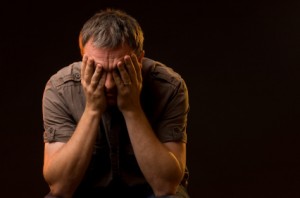 Male menopause symptoms can be subtle. Male menopause,or andropause refers to a condition that occurs in men as a result of declining hormone levels. These hormones are primarily androgens, the most common and important of which is testosterone. Therefore, male menopause is sometimes referred to as having low testosterone.
Male menopause symptoms can be subtle. Male menopause,or andropause refers to a condition that occurs in men as a result of declining hormone levels. These hormones are primarily androgens, the most common and important of which is testosterone. Therefore, male menopause is sometimes referred to as having low testosterone.
Unlike female menopause, which is characterized by very discreet symptoms that can develop very quickly, male menopause symptoms are frequently more subtle and easily attributed to, as well as being caused by other conditions. In women, hormones frequently decline very rapidly leading to sudden onset of symptoms. In men, declining testosterone and other androgens occurs more slowly. Because the symptoms in men related to hormonal decline are not as discreet as in women, there is some debate as to whether or not to use the term “menopause” for men.
Testosterone provides health benefits for every organ-system in the body. Thus, a decline in testosterone levels can contribute to a wide array of symptoms. The more common problems encountered in male menopause include a loss of libido and erectile dysfunction, fatigue and loss of energy, and depression.
The brain has a high concentration of testosterone receptors. If these receptors are not stimulated by testosterone, men can experience mental and emotional issues ranging from declining cognition and memory to mood swings and depression. Testosterone was sometimes used in the 1960’s and 1970’s to treat men specifically for depression.
Unfortunately, many patients and physicians have negative views of the use of testosterone because of the negative media reports of its use in sports. There is, however, an important safety profile difference in using testosterone in physiologic doses to treat medical conditions, and the use of supra-physiologic doses used by athletes to improve athletic performance.
Low testosterone may also increase the risk of developing diabetes, heart disease, cancer, and Alzheimer’s disease. Men with low levels of testosterone are more likely to develop more aggressive prostate cancers than men with more optimal levels.
Male Menopause Symptoms and Signs
- Decreased libido and sexual performance
- Decreased lean body mass and muscular strength
- Decreased energy/stamina/well-being
- Increased body fat
- Impaired glucose (blood sugar) utilization
- Increased total and LDL cholesterol
- Decreased wound and tissue healing
- Decreased bone density
- Elevated blood pressure
- Tendency towards depression and mood disorders
- Decreased skin tone and elasticity
- Increased tendon and joint degeneration
- Sleep disorders
I Have Symptoms Suggestive of Male Menopause
If you experience even just a couple of the above symptoms and are middle-aged, a physician should evaluate you, preferably someone experienced in the treatment of men with low testosterone. It is necessary to undergo a careful physical examination and to obtain blood work not only to assess hormone levels, but to also rule out other disorders that might cause similar symptoms, such as anemia, diabetes, heart disease, and other underlying conditions. Testosterone replacement therapy is effective in treating male menopause symptoms.
See related articles, “Low Testosterone Symptoms”, “Low Testosterone Levels”, “Nonsexual Symptoms of Low T”, and “Testosterone Therapy”.
